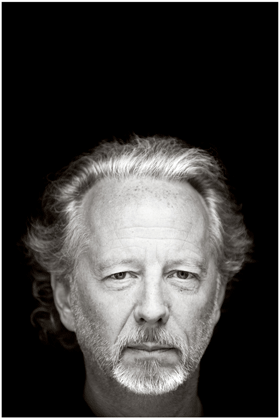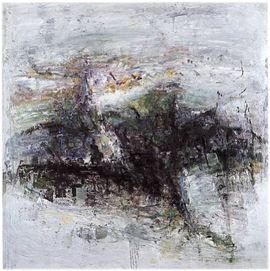| |
|
|
|

|
| |
|
|
Stefan Hertmans is considered one of the leading Dutch-language writers and poets of the present. He has published five novels, two volumes of short stories, eight volumes of essays on literature and philosophy, an autobiographical book on contemporary urban problems, and some twelve volumes of poetry. His work is widely translated, amongst others in England, France, Germany and Spain.
Hertmans received numerous prizes and nominations for his work. He has won several major literary prizes, such as the Flemish Culture Prize for Poetry for Muziek voor de overtocht (Music for the Crossing, 1994), a collection of five long poems on Paul Hindemith, Paul Valéry, Paul Cézanne, Vaslav Nijinsky and Wallace Stevens. The same collection was nominated the VSB poetry prize. The collection Goya als Hond (Goya as a dog, 1999) was acclaimed a true summit in his work and in Dutch and Flemish poetry of today. One of the poems won the prize for the best poem of 1999. He won the Ferdinand Bordewijk Prijs in 2002 for the novel Als op de eerste dag. In 2006 Hertmans published Muziek voor de overtocht. Gedichten 1975-2005 (Music for the crossing. Poems 1975-2005), a revised republication of all his poetry volumes.
October 2008 a next novel appeared, Het verborgen weefsel (The hidden Texture), an intimate story about a forty year old woman writer concerning her passions and melancholy.
|
| |
|
|

In 2012 Ergo Pers published Giotto's hemel (Giotto's heaven), a livre de peintre with poetry by Stefan Hertmans and etchings by the Flemish painter and draftsman Karel Dierickx.[1] Dierickx created a series of etchings inspired by early Renaissance sinopia drawings, in response to Hertmans' poems about Giotto, Piero della Francesca, Luca Signorelli and Fra Angelico.
|
|

Photograph Michiel Hendryckx
|
|
Hertmans published five novels, two story collections, six essay books and twelve collections of poetry.
Gestolde Wolken (Frozen Clouds, 1986), won Hertmans the Multatuli-prize of the city of Amsterdam.
His volume of poems Bezoekingen (Visitations, 1988), won the Arch-prize of the Free Word and the tri-annual Prize of the Flemish Provinces
The title story of De grenzen van woestijnen (Borders of deserts, 1988), was translated into English and published in The Review of contemporary Fiction (Illinois) (summer 1994).
In 1994 the Kaaitheater in Brussels took up Hertmans' first play, Kopnaad (Suture, 1990); it was directed by Jan Ritsema. This production was staged for the Theaterfestival 1995 and then in various cities in Flanders and Holland. Fischer Verlag Frankfurt published the German edition, which was turned into a Berlin radio play in 1997.
To Merelbeke (1994), a novel described as an ironical "autobiographical lie" about a Flemish youth, was widely praised and nominated for the Libris prize and the ECI prize. A German translation was published in 1996 (Amselbach, Kiepenheuer Verlag Leipzig).
Muziek voor de overtocht (Music for the crossing, 1994), a volume of five long poems on Paul Hindemith, Paul Valéry, Paul Cézanne, Vaslav Nijinsky and Wallace Stevens, won the Belgian State prize for poetry 1995.
Steden – verhalen onderweg (1998), a novel in an autobiographical key, relates Hertmans' impressions of European cities such as Dresden, Tübingen, Trieste, Venice, Bratislava, and Marseilles. The book was nominated for the Generale Bank-prijs (former & later AKO). Reaktion Books, London, published a translation of this book in 2001. A French translation was published by Le Castor Astral in 2003 (Entre Ville); it won the Prix La Ville à Lire/France culture.
Goya als Hond, a volume of poetry, was was awarded the ‘Maurice Gilliams Prize 2002’. One of the poems won the prize for the best poem of 1999.
‘As on the first day’ ('Als op de eerste dag') (2001), was nominated for the AKO-Prize, and was awarded the ‘Ferdinand Bordewijk’ Prize by the Jan Campert Foundation. This novel was published in French as Comme au premier jour by Christian Bourgois ed., Paris, in 2003.
In 2000, Hertmans wrote a philosophical reflection on the obscene in contemporary imagination, called Het Bedenkelijke. His publishers released it as part of a series, with books by Peter Sloterdijk, Jacques Derrida, Slavoj Zizek.
Hertmans wrote a second theatre play for the Brussels Kaaitheater, Mind the Gap, about the obsessive power of women in Greek tragedies (Antigone, Clytaemnestra, Medea). In autumn 2001, it became a stage production by Toneelgroep Amsterdam with Gerard-Jan Rijnders. (Mind the Gap, Meulenhoff 2000).
His compendium of essays on theatre, Het zwijgen van de tragedie (The silence of tragedy, 2007), won the Five Year Prize for Essay from the Royal Academy for Dutch Linguistics and Literature (KANTL). Spanish translation El Silencio de la Tragedia was published by Pre-Textos in 2009.[citation needed]
Other works
Borders of Deserts, short story in The Review of contemporary Fiction, Summer 1994, Illinois USA.
The Tail of the Magpie, short story, and selection of poems in The literary review, 1997, Madison USA.
Poems in Modern Poetry in translation, selection of twenty poems translated by Theo Hermans, Yann Lovelock e.o., London winter 1997
‘Marsyas’, in Grand Street 70, spring 2002, New York
Poems in New European Poets, Ed. Wayne Miller & Kevin Prufer, Graywolf Minnesota 2008
Anne Marie Musschoot, The courage of the critical intellect, essay followed by extracts and poems, in The Low Countries, Arts and society in Flanders and the Netherlands, Yearbook 1997-1998, p. 178-186.
|
| |
|
| |
|
|
 |
| |
|
|
Ruimte. Novel. Gent, Van Hyfte, 1981
Ademzuil. Poetry. Gent, Grijm, 1984.
Melksteen. Poetry. Gent, Poëziecentrum, 1986.
Gestolde wolken. Short stories. Amsterdam/Leuven, Meulenhoff/Kritak, 1987.
Zoutsneeuw. Elegieën. Poetry. Amsterdam/Leuven, Meulenhoff/Kritak, 1987.
Bezoekingen. Poetry. Amsterdam/Leuven, Meulenhoff/Kritak, 1988.
Oorverdovende steen. Essays about literature. Essays. Antwerpen/Amsterdam, Manteau, 1988.
De grenzen van woestijnen. Short stories. Amsterdam/Leuven, Meulenhoff/Kritak, 1989.
Sneeuwdoosjes. Essays. Amsterdam/Leuven, Meulenhoff, Kritak, 1989.
Het narrenschip. Poetry. Gent, Poëziecentrum, 1990.
Verwensingen. Poetry. Amsterdam/Leuven, Meulenhoff/Kritak, 1991.
Kopnaad. Poetry; drama. Amsterdam/Leuven, Meulenhoff/ Kritak, 1992.
Muziek voor de overtocht. Poetry. Amsterdam/Leuven, Meulenhoff/Kritak, 1994.
Naar Merelbeke. Novel. Amsterdam/Leuven, Meulenhoff/ Kritak, 1994.
Fuga’s en pimpelmezen. Over actualiteit, kunst en kritiek. Essays. Amsterdam/Leuven, Meulenhoff/Kritak, 1995.
Francesco’s paradox. Poems. Amsterdam/Leuven, Meulenhoff/Kritak, 1995.
Annunciaties. Poems. Amsterdam, Meulenhoff, 1997.
Steden. Verhalen onderweg. Prose. Amsterdam/Leuven, Meulenhoff/Kritak, 1998.
Het bedenkelijke. Over het obscene in de cultuur. Essays. Amsterdam, Boom, 1999.
Waarover men niet spreken kan : elementen voor een agogiek van de kunst. Brussel, VUBPress, 1999.
Goya als hond. Poetry. Amsterdam, Meulenhoff, 1999.
Mind the gap. Drama. Amsterdam, Meulenhoff, 2000.
Café Aurora. Essays; with the work of artist Jan Vanriet. Breda, De Geus, 2000.
Als op de eerste dag. Roman in verhalen. Novel. Amsterdam, Meulenhoff, 2001.
Het putje van Milete. Essays. Amsterdam, Meulenhoff, 2002.
Engel van de metamorfose. Over het werk van Jan Fabre. Amsterdam, Meulenhoff, 2002.
Vuurwerk zei ze. Gedichten. Poetry. Amsterdam, Meulenhoff, 2003.
Harder dan sneeuw. Novel. Amsterdam, Meulenhoff, 2004.
Kaneelvingers. Poetry. Amsterdam, De Bezige Bij, 2005.
Jullie die weten. Drama. Gent, Poëziecentrum, 2005.
Muziek voor de overtocht. Gedichten 1975-2005. Poetry. Amsterdam, De Bezige Bij, 2006.
Het zwijgen van de tragedie. Essays. Amsterdam, De Bezige Bij, 2007.
Het Verborgen Weefsel. Novel. Amsterdam, De Bezige Bij, 2009.
De val van vrije dagen. Poetry. Amsterdam, De Bezige Bij, 2010.
De mobilisatie van Arcadia. Essays. Amsterdam, De Bezige Bij, 2011.
Giotto's hemel. Poetry. Artists' book with poetry by Stefan Hertmans and etchings by Karel Dierickx. Ergo Pers, 2012. |
| |
|
|

www.stefanhertmans.be
Poetry International Web - Stefan Hertmans
|
| |
|
|
|
| |
|
|
|
| |
|
|
 |
| |

Karel Dierickx, Die unsichtbare Zeit, 1995
|
|
Born in Ghent in 1940, Karel Dierickx is a painter, sculptor and draftsman. Dierickx has been persistently working for decades on a coherent oeuvre. His work tends between abstraction and figuration and fascinates through its highly artistic intensity. Whatever medium he uses — painting, sculpture, drawing or etching — hidden in each work is a vulnerable longing for timelessness.
In his work Karel Dierickx constantly observes the never ending process of decay and death, and creates his very own, suggestive universe trough rather traditional subjects, including landscape, interior, still life, and the human figure. Dierickx does not so much depict the rich variety of forms and subjects realistically, but rather recreates them pictorially out of lines and strokes. The object, the motif, loses its interpretability, thus liberating one’s vision for direct contemplation of the drawing itself.
In his etchings, Karel Dierickx alludes to his own drawings, translating them to the medium of print. In the studio of master printer Henri Hemelsoet, he acquired a broad range of etching techniques, ranging from soft-ground etching (vernis mou), sugar lift aquatint and intaglio engraving.
For Giotto's hemel (Giotto’s heaven), Dierickx was inspired by early Renaissance sinopia drawings, the sketches made for frescoes.
|
 |
|

|
| |
copyright © ergo pers | some rights reserved |
|
site design by Zeuxis
|
|
